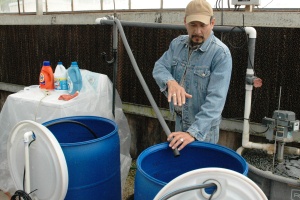
Sanitation District No.1 (SD1) of Northern Kentucky is the second largest public sewer utility in Kentucky with a service area that covers approximately 220 square miles. It is responsible for the collection and treatment of northern Kentucky's wastewater, as well as regional storm water management.
Camp Hill Borough, a historic town in Cumberland County Pennsylvania has been fined $140,000 by the Department of Environmental Protection for its unauthorized and unreported sewage discharges over the past two years.
Community groups in Louisiana and Texas have filed a suit against the EPA, due to their failure to meet Clean Air Act deadlines and revising rules that require more accurate pollution reporting.
Wastewater sludge is a semi-solid material that accounts for 50 percent of operating costs and about 65 percent of environmental impact in order to purify the water. After being tested in 50 wastewater treatment plants in various countries, a new additive called LODOred may be able to purify the sludge more efficiently.
BlackGold Biofuels opened up a new facility in North Carolina, where wastewater will be converted into biofuel. Though it is common practice for cooking oils to be recycled into biofuels, transforming wastewater into biofuel is a more transient feat and not as common.
Discharged water at a Russian refinery will be able to meet strict regulations for limits of chemical oxygen demand in river by using GE’s ZeeWeed wastewater treatment technology to reduce freshwater consumption.
The U.S. Department of Justice and the EPA have approved a decree that will give the Unified Government (UG) of Wyandotte County/Kansas City, Kan., four years to develop a sustainable plan and implementation schedule for integrated overflow control.

Research on gray water use for home irrigation has been getting positive initial results.
A Spanish poultry processing firm will be upgrading its wastewater treatment plant with GE LEAPmbr Membrane Bioreactor Technology, which will double the water treatment capacity within the same footprint of the existing wastewater plant and will improve the quality of water that is discharged to comply with regulations.
At Aquatech India on April 8-10, GE will be showcasing its technologies that are helping India battle its water and wastewater challenges.
The Egyptian Ethylene and Derivatives Company (ETHYDCO) has entered into a contract with Aquatech to provide a water treatment facility, which will also include the first Zero Liquid Discharge (ZLD) plant for Egypt.
Due to the sewer’s proximity to downtown, the City of Austin selected tunneling methods to avoid major public disruption. The five shaft locations were also chosen based on geotechnical investigations and to limit the public impact by the project.
Ávila, Spain will be using GE’s ZeeWeed 500D membrane bioreactor technology to double the amount of water and improve the quality of effluent water without increasing the facility’s footprint.
MWH/URS has been selected for a joint venture with the San Francisco Public Utilities Commission to help improve the Central Bayside. The project is expected to convey dry and wet weather flows from San Francisco’s north and central bayside areas to the Southeast Treatment Plant, incorporating “green” and “grey” solutions.
The Baswood BioViper wastewater pretreatment system has begun operations at a Dr Pepper Snapple Group bottling plant, which helps support sustainability and reduces costs.
Participants from Albania to Zimbabwe tested their local waterways, according to the new Year in Review report from the Water Environment Federation and the International Water Association.
Four communities in Tennessee have received more than $15 million in low-interest loans for water and wastewater infrastructure improvements.
With new water recycling technology powered by GE, two Texas power plants will be able to recycle more than 98 percent of wastewater and eliminate wastewater discharge to drought-ridden areas.
FreeWave’s reliable, long range and easily deployed radios gather and transmit critical data for water and wastewater facilities.
As part of the new contract with GE and the world’s largest wastewater treatment plant, eight vertical variable-speed power conversion drive trains will power the STEP Feed Pipeline Project, GE solutions will increase energy efficiency, lower maintenance, and control plant water flow, and will help strengthen the presence of GE’s power conversion business in the Middle East Water Industry.